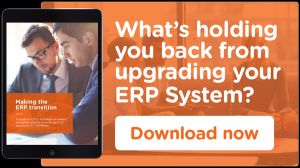Published on the 12/09/2016 | Written by Zag

If you’re reading this article, chances are your business is coping with business system ‘pain’…
It may be either related to or a direct result of increasing business demands on old technology. Yet, you also know that ‘change’ comes with its share of pain too (not to mention, cost). So, if you’re considering upgrading to a new ERP system, how do you know when it’s the right time to take the plunge? In this blog post, we’ll explore the typical drivers that propel organisations to seek change. But most importantly, we reveal the critical factor that most businesses overlook – what is the final ‘clincher’ that gets the project across the line? Demand from Board or CEO level Change in ownership / acquisition or investment New markets / new customers There are also many ‘reasons’ for change which we explore further in our new guide: A guide for CFO’s and decision makers struggling with the growing pains of successful NZ businesses. So with all this pain, why do so many companies delay the decision to change ERP Systems? What’s the deal breaker? Getting the project across the line involves many players company-wide. Each department will have their own motivations and reasons for selecting a certain solution or blocking change entirely. Ultimately, it’s stakeholder alignment that determines the timing and requirements of a new ERP system – not the pain points of the legacy system or the individual motivations of key stakeholders. More often than not, a lack of stakeholder buy-in is the fundamental reason new ERP projects are derailed. Want to avoid a wasted ERP journey for your business? Download our full guide to get more in depth insights, advice and strategies to help you achieve stakeholder alignment in your business, so that you can experience the benefits of a modern, efficient ERP backbone for success.
Change ‘from above’ is a common driver behind businesses embarking on the ERP transition journey. The CEO or Board’s desire to deliver their vision is being impeded by a lack of visibility over numbers due to disparate systems or issues with legacy systems.
‘New blood’ or ‘new skin in the game’ drives momentum, focus and the funding needed to drive the project forward.
There’s nothing like strong growth to compel a company to invest in better business systems and revisit projects that may have lacked hard reasons for change in the past.
Through our experience working with NZ companies across different sectors and industries, despite all the very compelling drivers and reasons for change outlined above, the ‘clincher’ which signals the ‘right time’ for a business to start down the ERP implementation path is stakeholder goal alignment.






























